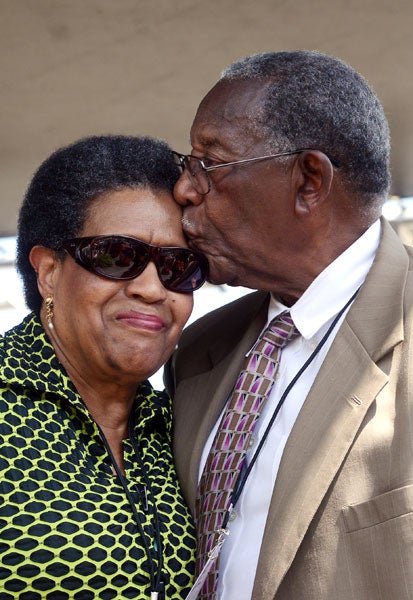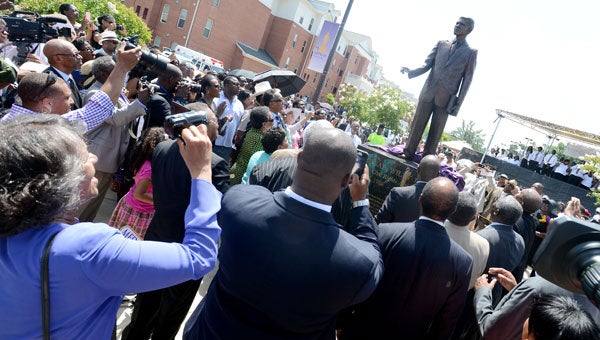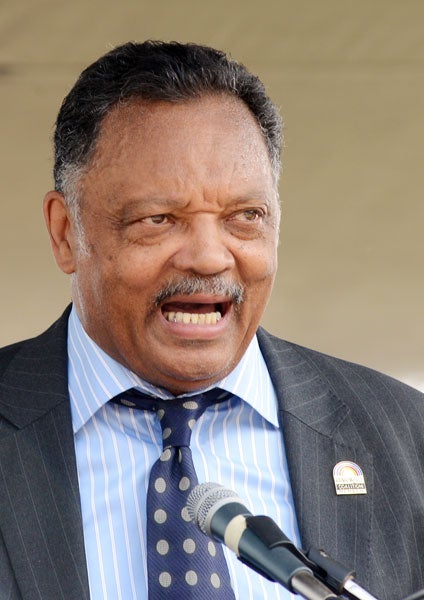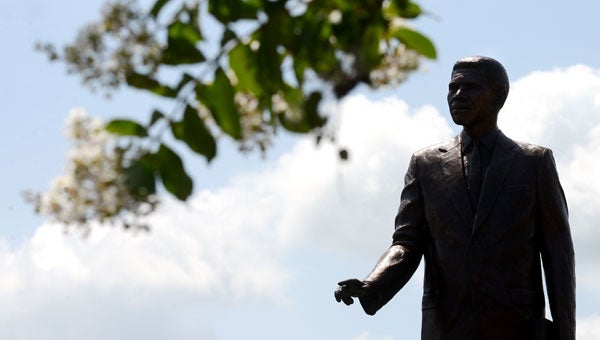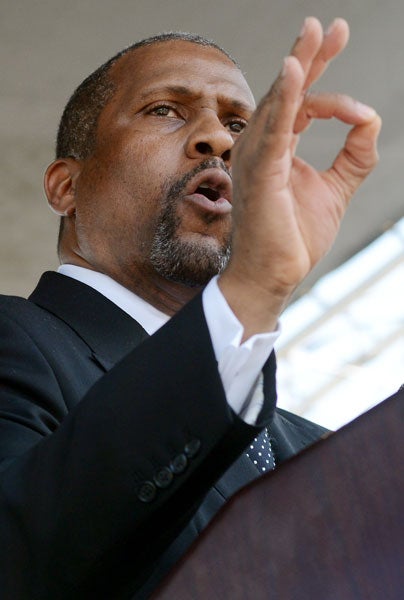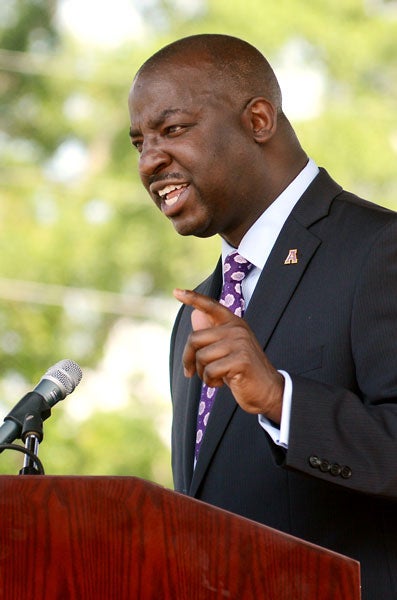Family, crowds gather for Evers unveiling ceremony at ASU
Published 12:01 am Friday, June 14, 2013

JAY SOWERS / THE NATCHEZ DEMOCRAT — The Medgar Wiley Evers ’52 Memorial was unveiled to the public during a dedication ceremony on the campus of Alcorn State University on Thursday morning.
NATCHEZ — Medgar Evers had things he wanted for himself and for others — things like equal rights and equal access — but one thing he never wanted was attention.
But 50 years and one day after he was assassinated outside his home in Jackson, a crowd of hundreds gathered on the campus of Alcorn State University to honor his legacy with the unveiling of a larger-than-life bronze statue of the civil rights leader. The monument was funded by a capital campaign driven by the ASU Foundation and the Alcorn Alumni Association.
Evers’ widow, Myrlie Evers-Williams, said she felt during his lifetime that people did not appreciate Evers and his work because he would not self-promote.
“He would say to me, ‘I am not about that; I am about getting the job done,’” Evers-Williams said.
But five decades after his death, Evers-Williams said she thanked those who made the memorial possible more than she could express. “(Alcorn) is Medgar’s home, this is the home of his family, because we met the first hour of the first day I was on campus by the President’s house,” she said.
Evers was the first field secretary for the NAACP in Mississippi. He filed test case lawsuits against the University of Mississippi to push for integration of the school, helped organize boycotts and was outspoken against civil rights-related abuses and killings in Mississippi. He died June 12, 1963, after being shot in the back in his driveway by a member of the White Citizens’ Council, Byron De La Beckwith. At the time of the shooting, Evers was carrying T-shirts that read “Jim Crow Must Go.” He was buried in Arlington National Cemetery in Virginia.
- JAY SOWERS / THE NATCHEZ DEMOCRAT — Myrlie Evers-Williams, left, gets a kiss on her forehead from her brother-in-law Charles Evers during a ceremony celebrating the dedication of the Medgar Wiley Evers ’52 Memorial on the campus of Alcorn State University on Thursday morning.
- JAY SOWERS / THE NATCHEZ DEMOCRAT — The Medgar Wiley Evers ’52 Memorial was unveiled to the public during a dedication ceremony on the campus of Alcorn State University on Thursday morning.
- JAY SOWERS / THE NATCHEZ DEMOCRAT — Civil rights leader the Rev. Jesse Jackson speaks to the gathered crowd about the legacy of Medgar Evers during a ceremony celebrating the dedication of the Medgar Wiley Evers ’52 Memorial on the campus of Alcorn State University on Thursday morning.
- JAY SOWERS | THE NATCHEZ DEMOCRAT — The Medgar Wiley Evers ’52 Memorial was unveiled to the public during a dedication ceremony on the campus of Alcorn State University on Thursday morning.
- JAY SOWERS / THE NATCHEZ DEMOCRAT — Civil rights leader the Rev. Jesse Jackson was in attendance during a ceremony celebrating the dedication of the Medgar Wiley Evers ’52 Memorial on the campus of Alcorn State University on Thursday morning.
- JAY SOWERS / THE NATCHEZ DEMOCRAT — Tavis Smiley offers the keynote remarks during a ceremony celebrating the dedication of the Medgar Wiley Evers ’52 Memorial on the campus of Alcorn State University on Thursday morning.
- JAY SOWERS / THE NATCHEZ DEMOCRAT — Alcorn State University President Dr. M. Christopher Brown II gives the opening remarks during a ceremony celebrating the dedication of the Medgar Wiley Evers ’52 Memorial on the campus of Alcorn State University on Thursday morning.
But despite his death, the overwhelming message of those who attended the memorial dedication was that Evers, in some ineffable way, lives.
ASU President M. Christopher Brown II said he believes the “racial Judases” who killed would have stayed their hands if they had realized what his killing would kick off. Evers’ murder was an event that would push the civil rights movement to a new level, Brown said.
“The message here is ‘be careful who you kill,’ because God may have put his breath in them,” Brown said. “They broke open his flesh and released into the universe the civil rights movement.
“As he swallowed blood, he spit out injustice.”
A debt of gratitude is owed to Medgar Evers for what he did in life and for giving his life, Brown said.
“This bronze is just an installment on the debt we owe,” he said.
The Rev. Jesse Jackson pointed out that, as he led grassroots efforts for change, Evers did not volunteer to die.
“He volunteered to serve,” Jackson said.
“Do not take lightly the price Medgar paid and what he actually did.”
But even though Evers did not volunteer to die, Jackson said he lives through the actions of everyday people.
“He lives every time we vote, and he lives every time we choose school over jail,” Jackson said.
“There is nothing we can’t do because his blood keeps oozing power and justice.”
The core of Evers’ legacy can be found in the message that he often preached, that you can kill a man but you can’t kill an idea, Sen. John Horn of Jackson said.
“Medgar Evers and people like him changed Mississippi,” Horn said. “They did it by lighting the dreams of everyday folks who — once they were lit up — refused to give up.”
But Tavis Smiley — a television and radio host who was the keynote speaker at the dedication — said he did not want those present to get the impression that Evers was a superman.
“I sometimes worry we elevate these black heroes too highly, that we almost elevate them to the levels of deity,” he said. “We need to honor them but not at the expense of telling these young people they can’t do great things. Medgar Evers and Myrlie Evers were ordinary people.”
When it was unveiled, the statue stood 8-feet tall and was mounted on a five-foot-by-five-foot-tall pedestal. Evers was depicted holding a book and with his right hand slightly raised, pointing toward Jackson.
Artist Ed Dwight made the statue, and said that of the 120 monuments he has made the Evers memorial was the most important.
“This monument is all about love, because Medgar really, really loved his family and he loved people,” Dwight said.


